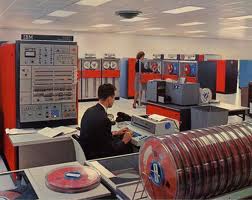Act II. Somewhere in 1978 or 79, the Amsterdam department store
De Bijenkorff opened a new sales corner on its 4th floor, mysteriously named "huiscomputers" and it featured a new product, the Apple II home computer. At that time most people, including myself, would conceive of computers as "electronic brains" (Germans called them "Elektronengehirne," before they called them "computers," before they called them "Rechner,") all built by IBM, all infinitely expensive, large, and remote.
Act I. My first contact with computer had been in 1972, when I took an algebra class at the
Free University of Berlin and we were tasked to program
matrix inversions and some such in Algol68, the programming language
du jour. This was done by (1) punching Hollerith cards in the right places, on special machines located in the university's computing center, then (2) placing the cards in the intray located in the hallway outside the main operating room where the computer was located (there was only one), (3) waiting for an operator to appear to empty the intray (he would open a wing door, and allow you a glimpse at the electronic brain, humming and chugging along in fluorescent light, tape decks clicking back and forth), (4) then waiting another hour or so for the operator to reappear with the "output," --- folded stacks of paper in a very large format, the name of the "job" (no pun intended) printed in very large letters on the first page. If your stack was very thin (as it usually was) this could mean only one thing: something had gone wrong. You would (5) try to find the error, or try to find some help to find the error, correct it, (6) resubmit your job, and repeat the process
ad infinitum. Usually, it would take only a few days until a program of a few lines code would finally run properly.
Act II, cont'd. So far so good. Back to the department store. What could you do with a home computer, I asked the sales person. Well, he said, you could store cooking recipes and call them up as appropriate. I didn't buy one.
Act III. We're now at Dartmouth College, NH, and the day is Jan 16, 1984. In between, I had become interested in a computer simulations, and was visiting there Dartmouth's
Research Policy Center, run by
Dennis Meadows of
The Limits to Growth fame (the book) to learn more about his approach, called "System Dynamics." To repeat, the day is Jan 16, a Monday, and we all must go and have a look at the new Apple computer, the
Macintosh. So we cross the icy, snowy campus, and arrive in a dedicated room of the computing center, where a passionate lady demonstrates to us what a rectangular box, white, with a small screen, and a funny device, called "mouse," linked to the computer could achieve together. There was also a small matrix printer with ugly output. But, but, you could create sketches on the Macintosh screen by moving the mouse across the table, and then print them on the printer. Also, you could use different fonts, when printing a text. This led to typographic orgies of the worst kind for months on end (don't ask).
Act IV. A year and a half later. I'm returning to Dartmouth College on a regular basis for various projects, and spend a lot of time with Perry LaPotin, the polymath grad student, who has become an invaluable part of the Cold Region Research Lab of the Corps of Engineers, conveniently located next to the college. Perry was already writing programs for the Macintosh. There was only one small problem. You could not write Macintosh programs on the Macintosh, since its memory was too small. Apple had built another machine, the Lisa, sold only to professionals, whose memory was large enough, since it had a hard disk (HARD DISK). The hard disk was really large, 10 megabytes, but the was a little glitch in the hard disk space management. Lisa didn't always know when the hard disk capacity was exhausted, which led to hard disk malfunction, which then Perry had to repair by using a mix of erratic reset activity (the escape button, yes), brawn, and black arts. He spent roughly half of his working day resetting the hard disk. I still see him sitting there, patiently kicking our Lisa back to work. When we would finally go home, belatedly, exhausted, we turned our attention to the regrettable downward tendency of the Apple Computer stock price. Apple was already on its way out, since the Macintosh was fairly useless.
Act V. Now comes the part that is omitted in all the obituaries. A few weeks later, still 1985. The Apple laser printer appears on the market. And it prints like a professional printer, plug and play, 50 different fonts, some very convincing ones. Your manuscript looks just great, your letter looks just great, your writ, opinion, table of content, graphics (
Graphics) they all look great. It looks almost as if you can stop arguing, just putting your breath-taking graphics of the front page of your important contribution (the PC-world of MS-DOS, might, just might be able to connect to some laser printer and print something in Courier font until the next software glitch puts an end to such pretentiousness) but we, with our Apple laser printer, we rool (we meant "rule," but
rool is even better) we rule the world. My research grant applications are looking so much better than those of the competition, I'm collecting one grant after the other, until I get a Pioneer Grant from the Dutch goverment that allows me to start my own research institute, the Applied Logic Laboratory. I'm still convinced that my success in those years hinged on the flawless Macintosh laser print of my submission, and in particular on the flawless laserprinted tables of content done by the best text processor of those days, Wordperfect. For example, the committee for the Pioneer grant met only once, with forty longish application to evaluate, and only one grant to award. You an bet that they started reading the stuff when stepping on the train for their meeting in The Hague (much Dutch work gets done on trains, as Paul Krugman), and they had barely time to read the tables of content. Mine was the best.
Anyhow, the laser printer constituted a quantum leap, and many people understood, got their Macintosh laser act together, bought the stuff. and saved the company.
Stay tuned.
Act VI. It's three years later 1988, and I'm back in Amsterdam. The Macintosh II appears on the market, the first bona fide machine with a color screen. Somebody wrote a program that would generate Mandelbrot's fractals in real time and the annual Dutch software exhibition features nothing but magic lanterns that move according to the incorruptible logic of Mandelbrot's algorithm.
 |
| A typical Mandelbrot image (Helix 2) |
Interlude (short). We're also getting a research contract with
IBM, since IBM has now a Unix machine, a mini computer, half way between a PC and a small mainframe (for insiders only: think VAX). We would get the computer for free (listprice perhaps 100 kay, regardless of the currency), work with it, and produce a report. Nerd alert: IBM has a Unix machine. Not Unix of course (nor Linux, which didn't exist in those days), but some Unix dialect that is supposedly compatible with standards Unix (of course it isn't). A small step for mankind, but a big step for IBM.
Now, in order to use the machine, we had to connect it to our network. And it's an ethernet-(work). "Is your new machine ethernet-compatible," we ask IBM. "We are the best," the man in the blue suits sing in unison while pummeling their breasts (there was a dress code at IBM in those days, blue suits, white shirt, tie), "so our machine is ethernet compatible."
So we connect the IBM machine (something with lot's of "8" in the name) to our Ethernet. Nothing happens, of course. We call IBM. "It's your fault," the men in the blue suits sing over the telephone while pummeling their breast, have you though of switching your network on?" This goes back and forth for a few month. "Have you thought of this, have you thought of that?" Yes, we have. One fine day, A delegation from IBM descends from heaven in the spaceships that Emmerich's Independence Day made so famous. Several people. They switch on the machine, they think of this and of that, but nothing happens. This takes the whole day. Finally, finally, they have the answer. "Yes, they say, it's obvious, you are using the latest Ethernet version, and our machine is not yet compatible with your version. It's your fault."
I'm not making this up.
Act VII. My research center (initially cursed with the hopeless name CCSOM) is growing, and we need more computers














,+Switzerland,+summer+of+2012.JPG)































